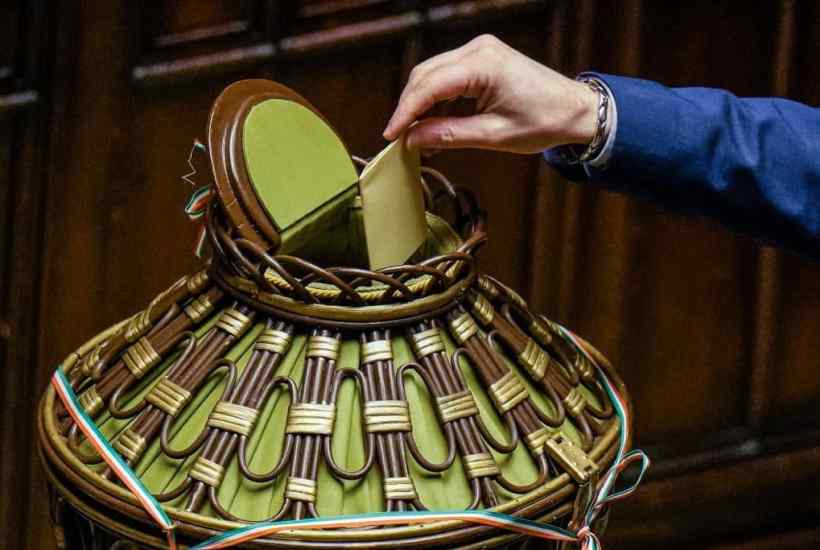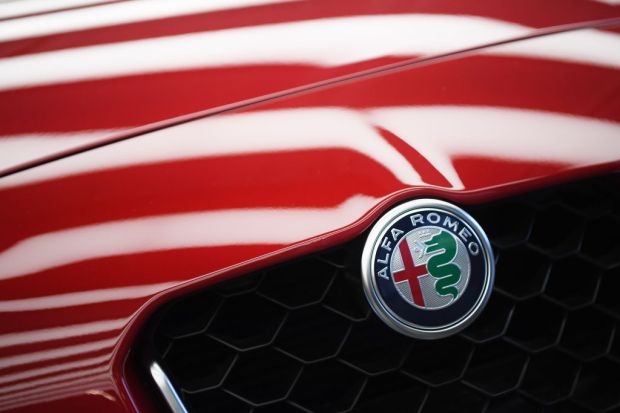In ancient Rome, a diviner called a haruspex would observe the entrails of sacrificed sheep and poultry, especially their livers, to deduce the will of the gods. But even the finest haruspex would have a hard time deducing the will of the 951 parliamentarians and 58 regional delegates – the so-called grandi elettori – whose task this week is to elect Italy’s 13th president.
Italian presidents, who serve for seven years, have largely ceremonial powers and their election is normally of little importance. This time, however, depending on the result, there could be at least one and possibly two seismic knock-on effects.
First, the presidential election could force a snap general election which if the opinion polls are correct would see the coalition of the right return to power on its own for the first time since Silvio Berlusconi was forced to resign in 2011.
This would be a nightmare come true for the Euro Establishment – that unholy alliance of Davos men and woke tyrants – who dread the idea of Matteo Salvini, leader of the sovranista Lega, or Giorgia Meloni, leader of the post-fascista Fratelli d’Italia, becoming prime minister. It would amount to nothing less than a renaissance at the heart of the EU of ‘far right populism,’ ergo ‘fascism’ – to use the lingo of the Euro Establishment – or to use a more truthful definition: patriotic libertarianism. Fratelli d’Italia, for example, is led by Giorgia Meloni whose inspiration, regardless of her party’s roots, is not Benito Mussolini but Roger Scruton.
Second, the presidential election could transform the Italian presidency by a process of osmosis, set in motion by the persona and prestige of Mario Draghi. If he is elected he would potentially turn the presidency from a primarily ceremonial role into a primarily executive, political force alla francese – at the expense of prime minister and parliament.
Yes, the name on everyone’s lips as next president is that of Draghi – the 74-year-old ex-boss of the European Central Bank and ex-managing director of Goldman Sachs, who is the current prime minister of Italy. But the question is not just what happens if Draghi becomes president but what happens if he does not?
For as any haruspex worth his salt could tell you from observing the shine, shape and general state of the livers at his disposal, whether it is the will of the gods to anoint Draghi president is by no means clear. Indeed, right now, those very livers are surely indicating that another candidate must triumph – even if their identity still remains a mystery.
Draghi is not even an elected parliamentarian but was appointed last February by the now out-going president Sergio Mattarella as head of an emergency government of national unity, in a desperate bid to avoid a general election in the middle of the Covid pandemic. This followed the collapse of the coalition government of Giuseppe Conte and parliament’s failure to agree on a replacement.
Il Grande Gesuita (The Great Jesuit) – as he’s nicknamed because he was educated in a Jesuit College – has made it clear that he wants to be president. Yet if he is elected, not only is it highly likely that parliament will fail once again to find a new prime minister from within its own ranks to replace him, but Draghi as the new president may also fail to find an extra-parliamentary one acceptable to parliament. So there will have to be a snap general election.
Yet few in parliament want such an election – and many are desperate to avoid one – except Fratelli d’Italia which is the only major party that refused to join the Draghi government. And the only way to avoid an election is to ensure that Draghi does not get elected president.
The parties most scared of facing the verdict of the popolo at the ballot box are the alt-left 5 Stelle – the party which has the most seats in parliament – and the post-comunista Partito Democratico (PD) which has the third most seats and which the mainstream media inevitably calls ‘centre-left’ rather than ‘far left’.
Support for 5 Stelle, which is riven by internal schisms, has collapsed from the 33 per cent it got at the last general election in 2018 to about 15 per cent in the polls now. And although the PD is the most popular party just ahead of the Lega and Fratelli d’Italia (all polling about 20 per cent), it has no chance of forming a government after a new election as things stand. Potential allies such as 5 Stelle – once its sworn enemy but now its coalition partner – do not have enough popular support.
Belatedly, the PD leader, Enrico Letta, has now decided his parliamentarians should vote for Draghi regardless. But given the ballot is secret it is by no means certain they will obey him. Letta had tried feverishly to find an alternative prime minister to allow Draghi to be president without the fear of a general election – to no avail. He had also tried to convince the out-going 80-year-old president, Sergio Mattarella (PD), to serve a second term even though he has made it clear that he does not want to do so.
As for 5 Stelle, it looks like the official line will be to not vote for Draghi in order to keep him as prime minister, though given the party’s fractured state some will and others will not. Others still have quit the party and are independent. But nor are two of the three right wing parties keen on a snap general election either.
Initially this was because both the Lega – which has the second most seats in parliament – and Silvio Berlusconi’s conservative Forza Italia, which is no longer the dominant force it once was but still polling about 9 per cent, wanted Berlusconi, the 85-year-old media tycoon and four times prime minister, as president which meant keeping Draghi as prime minister.
But on Saturday Berlusconi threw in the towel before voting began on Monday when it became clear that he probably did not have the necessary numbers to win.
Despite this, even though Il Cavaliere (The Knight) as he’s called by supporters – or Il Caimano (The Caiman) as he’s called by his enemies – is no longer in the running both he and Salvini still want Draghi to remain as prime minister.
They want one of their alternative candidates to Berlusconi as president but they also feel Draghi is doing a very good job as head of the national unity government in which they both have ministers and that he should remain prime minister until parliament’s five year mandate expires on 1 June 2023.
In addition, the Lega has trailed Fratelli d’Italia in the polls for the past year or so as the most popular party of the right and Salvini – Il Capitano as he’s nicknamed – hopes to reverse that trend before a general election next year, which if the right wins will mean that he gets to be prime minister and not Meloni.
If, on the other hand, Draghi is elected president then Berlusconi certainly and probably Salvini will join Meloni in demanding an immediate general election.
First term parliamentarians have an additional reason for wanting to avoid an early general election as failure to complete four and a half years of parliament’s five year mandate means they lose their right to a fat pension when they are 65.
As for the popolo, a hefty majority – around 60 per cent – want Draghi to remain as prime minister as well, according to the polls.
In an ideal world, the Euro Establishment would love Draghi to be president for life with dictatorial powers.
But their principal English language mouthpieces – the Financial Times and the Economist, which have praised him to high heaven since he became prime minister – are uncharacteristically divided
The Financial Times thinks he should be president because in the words of an editorial last week ‘a move upstairs to Italy’s presidency looks the best way to carry on the good work.’ But the Economist, which fears more than anything an election in Italy, says his ‘bid to become president is bad for Italy and Europe.’
Only Fratelli d’Italia wants an election now, whether Draghi is prime minister or president, because Meloni wants to capitalise on her party’s remarkable surge in support since the 2018 election at which it got just over 4 per cent. And also because she, not unreasonably, does not recognise the Draghi government as legitimate.
Voting so far has been surreally inconclusive. To win in the first three rounds of voting, a candidate needs a two thirds majority, which rarely happens. Thereafter, a simple majority is enough. No coalition has a majority of parliamentarians.
In the first round on Monday, the grandi elettori left two thirds of their ballot papers blank. The most votes anyone got was 36.
The second round on Tuesday was more or less a repeat performance. Wednesday’s third round clarified matters a little but not much and 400 odd ballot papers were left blank. Mattarella – who has said he does not want to be president again! – got the most votes on 125, many more than anyone else.
The most rounds ever required to elect an Italian president was 23 in 1971 but the result is usually sorted out once only a simple majority is required from the fourth round, which takes place on Thursday.
By then the Machiavellian horse-trading behind the scenes that decides the victor is more or less complete – even though the secret ballot means that no deals can be set in stone.
With Berlusconi no longer in the race the only candidate left who is a household name is Draghi.
Nevertheless, given the determination of so many parliamentarians to avoid a snap general election, a determination supported in the polls by a clear majority of Italians who want Draghi to remain prime minister, it is incredible that so much of the talk still assumes that he will be elected president – even more incredible as in the third round he got just five votes. We urgently need the best haruspex in Rome and a new set of sheep and chicken entrails in order to bring some much needed clarity to this very murky situation.
Got something to add? Join the discussion and comment below.
Get 10 issues for just $10
Subscribe to The Spectator Australia today for the next 10 magazine issues, plus full online access, for just $10.



















Comments
Don't miss out
Join the conversation with other Spectator Australia readers. Subscribe to leave a comment.
SUBSCRIBEAlready a subscriber? Log in